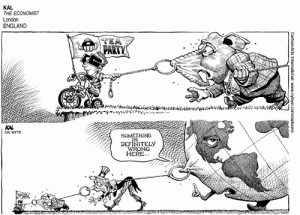
President Obama just signed the debt deal into law. Just in time too — there were about 10 hours to spare before the midnight deadline, after which our government would most likely go into default.
As bad as default would have been, the deal doesn’t appear to be a whole lot better.
As Andy Kroll explains over at Mother Jones:
The Obama-GOP plan cuts about $917 billion in government spending over the next decade. Nearly $570 billion of that would come from what’s called “nondefense discretionary spending.” That’s budget-speak for the pile of money the government invests in the nation’s safety and future—education and job training, air traffic control, health research, border security, physical infrastructure, environmental and consumer protection, child care, nutrition, law enforcement, and more.
Our country’s environmental laws and the agencies tasked with enforcing them have certainly taken a huge hit, which is especially troubling because the record-breaking heatwave we’re currently witnessing is only the latest projected impact of our warming climate to become all-too-real. We need strong climate policies and a clean energy revolution right now in order to avert runaway climate change. Instead, this deal jeopardizes even the most basic environmental protections, like the right to clean water and air.
The full implication of the Obama-GOP debt deal won’t be clear for some time, as the cuts it calls for are just the first round. The deal also mandates the creation of a 12-member “SuperCongress” committee that will determine where to make cuts totaling another $1.5 trillion. But given how things stand right now, environmental protections in this country have taken a severe blow.
- Guts Clean Water Act and Clean Air Act enforcement
The nearly $1 trillion in immediate cuts means a lot less money going to fund the important work done by the Environmental Protection Agency, the Energy and Interior departments, and other domestic agencies. If the SuperCongress fails to pass a bill making the required $1.5 trillion in further cuts by this December, that would automatically trigger another $1.2 trillion in cuts from various sectors, including energy and environmental programs.
What that means, essentially, is that the EPA and the Interior Dept. will have less money to enforce existing environmental and climate regulations. “There just won’t physically be the funds available to protect drinking water and to ensure there’s clean air to breathe,” says the Sierra Club’s Melinda Pierce (subscription required).
- Less money for states to enforce environmental laws, too
Slashing the EPA budget will have a drastic ripple effect, as the agency also provides funds for states to enforce their own environmental protections. Whether or not it will still be able to do that is very much in doubt.
- Lets Big Oil keep taxpayer-funded handouts
Glaringly absent from the deal is an end to the billions in taxpayer handouts Congress continues to give to Big Oil. Americans overwhelmingly support ending these subsidies, and it’s not like the oil companies need them: the top five Big Oil companies just announced obscene profits of $35.1 billion for the second quarter of 2011. Ending these taxpayer-funded subsidies would not raise gas prices, as Big Oil and its apologists in Congress like to claim, but it would save us somewhere between $30 and 40 billion over the next decade.
This deal literally lets the oil and gas industries keep their taxpayer-funded welfare money while forcing Americans to accept diminished protections for public health, clean air and clean water. So much for shared sacrifice.
- Dries up investments in renewable energy
Ben Schreiber, a tax analyst with Friends of the Earth, says the deal could also “drive a stake through the heart of investments in wind, solar, and other clean-energy technologies,” according to Mother Jones. “The clean-energy revolution becomes a casualty of these cuts,” Schreiber told MoJo.
- Further diminishes chance of establishing a carbon tax
As lopsided as the cuts may seem, both Democrats and Republicans made some token concessions in the deal. Republicans gave up on their insistence that there be a second vote to raise the debt ceiling again next winter, no doubt a cudgel they were hoping to wield closer to the 2012 presidential election. Democrats, meanwhile, completely caved on tax increases, or “revenue” in budget-speak. That sends a clear signal that imposing a tax on carbon emissions will be harder than ever to pass, no matter how much it could contribute to paying down our nation’s debt.
According to the findings of a debt commission led by former Sen. Pete Domenici (R-N.M.) and Alice Rivlin, a Democrat who was the founding director of the Congressional Budget Office, a carbon tax could raise about $1.1 trillion by 2025 while cutting carbon dioxide emissions 10 percent below 2005 levels.
But perhaps worst of all: The deal emboldens and strengthens the dirty energy apologists and climate deniers of the radical right who have been gunning for environmental protections all along. And, as Robert Reich wrote, “[T]he largest threat to our democracy is the emergence of a radical right capable of getting most of the ransom it demands.”
But I don’t want to end on such a sour note. All is not lost. The Hill reports that Democrats are planning to revive the fight over subsidies for Big Oil in the SuperCongress committee. And the Center for American Progress points out that this second round of cuts “presents progressives with an opportunity to channel their anger over the first round into relentless action to push for the kind of progressive second round of deficit reduction that America wants — and needs.”
Onward, environmental soldiers.